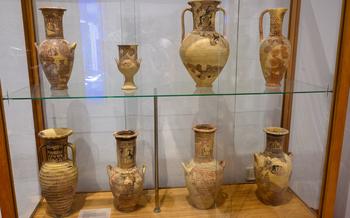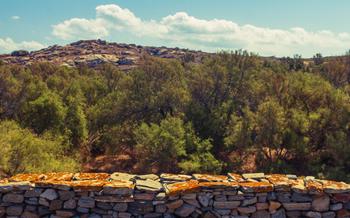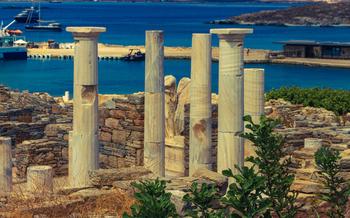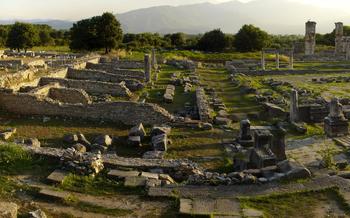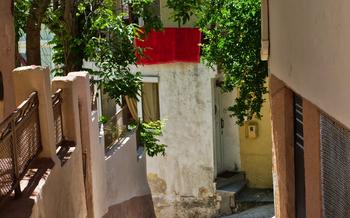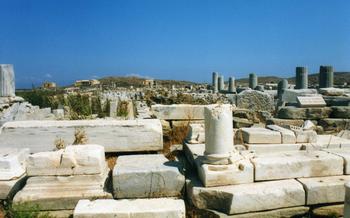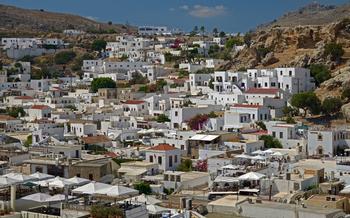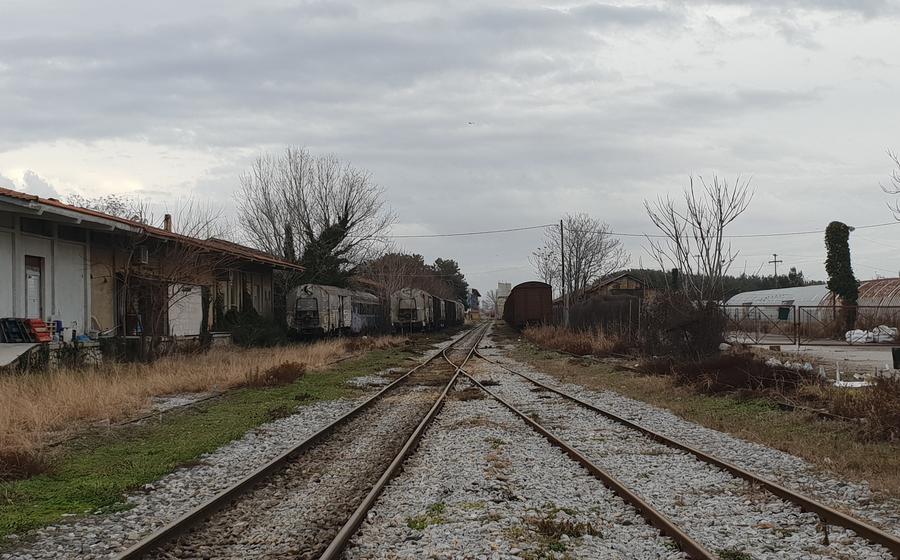
Ancient Zone Village Ruins
- Historical Background
- Location and Accessibility
- Hours of Operation and Admission Fees
- Exploring the Ruins
- The Agora
- The Acropolis
- Residential Areas
- Religious Sites
- Water Supply and Sanitation
- Events and Festivals
- Nearby Attractions
- Practical Tips
- Insider Tip: Unveiling the Hidden Treasures of the Ancient Zone
Historical Background
Alexandroupoli, a vibrant city in northeastern Greece, is steeped in a rich historical legacy that dates back to ancient times. The Ancient Zone Village Ruins, located within the modern city, hold the remnants of the ancient city of Sale, a significant settlement in the region during the Hellenistic and Roman periods.
Sale, founded in the 4th century BC, flourished as a major port city and commercial hub due to its strategic location on the coast of the Aegean Sea. The city played a crucial role in trade and cultural exchange between the Greek mainland and the islands of the North Aegean. Its strategic importance attracted the attention of various empires, including the Macedonians, Romans, and Byzantines, who left their mark on the city's history and architecture.
Archaeological excavations conducted in the Ancient Zone have unearthed impressive remains of Sale, including the Agora, the Acropolis, city walls, residential areas, and religious sites. These discoveries have shed light on the urban planning, daily life, and cultural traditions of the ancient inhabitants.
The Ancient Zone Village Ruins serve as a testament to the rich cultural heritage of the region and offer visitors a glimpse into the fascinating world of ancient Greece.
Location and Accessibility
The Ancient Zone is strategically situated in the heart of Alexandroupoli, inviting visitors to step back in time and explore the remnants of an ancient civilization. Located on a hill overlooking the city, the Ancient Zone offers panoramic views of the surrounding landscape. Its convenient location makes it easily accessible by various transportation options.
Visitors can choose to travel by public transportation, with buses regularly servicing the area. For those arriving by private vehicle, ample parking facilities are available, ensuring a hassle-free visit. The Ancient Zone is also designed to be accessible for individuals with disabilities, with designated pathways and ramps allowing them to navigate the site with ease.
Hours of Operation and Admission Fees
The Ancient Zone of Alexandroupoli is open to the public all year round. However, the hours of operation may vary depending on the season. During the summer months (June to September), the site is generally open from 8:00 am to 8:00 pm. In the off-season (October to May), the hours may be shorter, typically from 9:00 am to 5:00 pm.
Admission to the Ancient Zone is free of charge. This allows visitors to explore the ruins and immerse themselves in the history of the site without any financial barriers. The open-access policy encourages locals and tourists alike to appreciate the cultural heritage of the region.
Guided tours of the Ancient Zone are available for those who want a more in-depth understanding of the site. These tours are typically offered by local tour operators or through the Alexandroupoli Archaeological Museum. Fees for guided tours may vary depending on the size of the group, the duration of the tour, and the qualifications of the guide.
Exploring the Ruins
Explore the ruins of the ancient city of Sale, which include the Agora marketplace, the Acropolis hilltop citadel, and the remnants of the city walls and gates. Marvel at the architectural wonders of the Agora, with its well-preserved stoas, shops, and public buildings. Ascend the Acropolis to witness the remains of fortifications, temples, and other structures, and enjoy panoramic views of Alexandroupoli and the surrounding landscape. Wander along the ancient city walls, observing the defensive mechanisms and gates that once protected Sale from external threats. Discover residential neighborhoods, with remnants of houses, streets, and public spaces, offering a glimpse into the daily lives of ancient inhabitants.
The Agora
The Agora, the heart of ancient Sale, was a bustling marketplace and a vital gathering place for the city's inhabitants. Its rectangular shape, surrounded by stoas or covered walkways, created a vibrant public space where commercial activities, social interactions, and political discussions took place. The Agora was not merely a center of trade but also a symbol of the city's prosperity and civic life.
Excavations in the Agora have unearthed a wealth of artifacts, including pottery, coins, tools, and sculptures, providing valuable insights into the economic and social activities of ancient Sale. These artifacts showcase the city's extensive trade network, spanning from the Mediterranean to the Black Sea, and its production of various goods, such as ceramics, textiles, and metalwork.
The atmosphere of the Agora was likely filled with the sounds of bargaining merchants, the laughter of friends meeting, and the speeches of orators addressing the public. It was a place where people from all walks of life came together, exchanging goods, ideas, and stories, contributing to the rich tapestry of ancient Sale's urban culture.
As visitors wander through the ancient Agora today, they can almost hear the echoes of the past, imagining the lively scenes that once unfolded within its walls. It is a place that invites contemplation and reflection, allowing one to connect with the spirit of ancient Sale and marvel at the enduring legacy of this remarkable city.
The Acropolis
The Acropolis of ancient Sale, perched atop a hill overlooking the city and the sea, held immense strategic significance. Its fortified walls, constructed with precision and strength, served as the city's last line of defense against external threats. Within these walls, temples, administrative buildings, and other structures once stood tall, symbolizing the power and authority of the ancient city. The remains of these structures, though weathered by time, still exude an aura of grandeur and historical importance.
From the Acropolis, visitors are treated to breathtaking panoramic views of Alexandroupoli and its surroundings. The sparkling blue waters of the Aegean Sea stretch out towards the horizon, while the lush green hills and valleys of Thrace provide a picturesque backdrop. The Acropolis offers a vantage point that allows visitors to appreciate the beauty and strategic importance of ancient Sale, a city that once thrived at the crossroads of civilizations.
As you explore the Acropolis, let your imagination transport you back in time to witness the bustling activities that once took place here. Picture soldiers patrolling the ramparts, keeping a watchful eye over the city and its inhabitants. Imagine the lively debates and decision-making that occurred within the administrative buildings, shaping the fate of ancient Sale. And as you stand in the ruins of the temples, feel the spiritual connection that the ancient Greeks had with their gods and goddesses, paying homage and seeking their favor.
The Acropolis of ancient Sale is not just a historical site; it's a place where the past comes alive. It's a place where you can wander among the ruins, marvel at the architectural achievements of the ancients, and immerse yourself in the rich history and culture of this fascinating region.
Residential Areas
Within the Ancient Zone, the residential areas offer a glimpse into the daily lives of the ancient inhabitants of Sale. The layout of the neighborhoods, with their narrow streets and small houses, reflects the urban planning of the time. Remains of houses, shops, and public spaces provide insights into the social and economic structure of the ancient city.
The architectural styles and building techniques used in the construction of homes vary depending on the period and the social status of the residents. Grander houses, with elaborate facades and spacious interiors, belonged to wealthy merchants or government officials, while more modest dwellings were occupied by artisans, farmers, and laborers.
Exploring the residential areas of the Ancient Zone is like stepping back in time and imagining the hustle and bustle of daily life in ancient Sale. Visitors can envision the residents going about their daily routines, trading goods in the Agora, worshipping in the temples, or simply relaxing in their homes after a long day's work.
Religious Sites
Within the confines of the Ancient Zone, the presence of temples and other religious structures bears witness to the deep spiritual beliefs and practices of the ancient inhabitants. These sacred sites, imbued with historical and cultural significance, provide a glimpse into the religious landscape of ancient Sale.
The ruins of temples dedicated to various deities, such as Apollo, Zeus, and Artemis, stand as testaments to the polytheistic nature of the ancient religion. The architectural features of these temples, including intricate carvings, sculptures, and decorative elements, offer insights into the artistic and religious expressions of the time.
In addition to temples, other religious structures, such as altars, shrines, and sacred groves, have been discovered within the Ancient Zone. These sites served as places of worship, offerings, and rituals, providing a tangible connection to the spiritual practices of the ancient population.
The exploration of these religious sites offers visitors a unique opportunity to delve into the realm of ancient beliefs and customs. By examining the architectural remains, artifacts, and inscriptions, one can gain a deeper understanding of the role that religion played in shaping the cultural and spiritual life of ancient Sale.
Water Supply and Sanitation
The inhabitants of ancient Sale displayed remarkable ingenuity in their methods of securing a steady water supply. To meet the daily needs of the city, a complex system of aqueducts was meticulously crafted to channel water from distant springs and rivers to reservoirs within the city walls. These aqueducts, some of which have been preserved to this day, showcased the exceptional engineering skills of the ancient Greeks.
Furthermore, the city's water infrastructure included strategically placed cisterns and wells. These storage facilities ensured a reliable supply of water during periods of drought or disruption to the aqueducts. The cisterns were meticulously constructed using waterproof materials, ensuring the quality and purity of the stored water.
Equally impressive was the development of sanitation systems in ancient Sale. Public latrines, equipped with running water, were strategically located throughout the city, demonstrating the high level of hygiene and sanitation consciousness among its inhabitants. Drainage networks, carefully designed to channel wastewater away from the city, played a crucial role in maintaining public health and preventing the spread of disease.
The sophisticated water supply and sanitation systems of ancient Sale stand as a testament to the advanced level of urban planning and public health measures implemented by its ancient inhabitants. These systems not only ensured the well-being and prosperity of the city but also laid the foundation for modern sanitation practices still in use today.
Events and Festivals
The Ancient Zone of Alexandroupoli comes alive during various cultural events, festivals, and reenactments held throughout the year. These events offer a unique opportunity for visitors to immerse themselves in the history and culture of ancient Sale and experience the vibrant atmosphere of the ancient city.
One of the most popular events is the Ancient Sale Festival, held annually in the summer months. During the festival, the Ancient Zone is transformed into a stage for theatrical performances, musical concerts, and traditional dances, showcasing the rich cultural heritage of the region. Visitors can also participate in workshops and demonstrations of ancient crafts, such as pottery, weaving, and metalworking.
Another highlight is the Battle of Sale Reenactment, which takes place every year to commemorate the heroic defense of the city against the Persians in 480 BC. The reenactment involves hundreds of participants dressed in authentic costumes, who engage in a mock battle using replicas of ancient weapons and armor. The event is a thrilling spectacle that brings history to life and offers visitors a glimpse into the bravery and resilience of the ancient Saleans.
These events not only provide entertainment but also create a sense of community and foster a deeper appreciation for the region's cultural heritage. They offer visitors a chance to connect with the past, celebrate the present, and create lasting memories in the enchanting setting of the Ancient Zone.
Nearby Attractions
Beyond the Ancient Zone, Alexandroupoli offers a wealth of other historical and natural attractions. The city's Archaeological Museum houses a rich collection of artifacts from the region, providing further insights into the history and culture of ancient Sale and its surroundings. Nature enthusiasts can explore the nearby Dadia Forest, home to a diverse array of flora and fauna, including rare bird species. The picturesque village of Feres, with its traditional architecture and cobblestone streets, offers a glimpse into the region's rich cultural heritage. History buffs can delve into the past at the Battle of Doriskos Museum, commemorating a significant military conflict that took place in the area. For a relaxing getaway, visitors can head to the nearby beaches of Makri and Avdira, known for their crystal-clear waters and golden sands. Alexandroupoli's proximity to the Turkish border also makes it an ideal base for exploring neighboring regions and experiencing the unique blend of cultures in this vibrant corner of Europe.
Practical Tips
Recommended attire and footwear:
When exploring the Ancient Zone, it is advisable to wear comfortable clothing and sturdy footwear. The uneven terrain and the presence of loose stones or debris require proper support and protection for your feet. Avoid sandals or flip-flops, as they may not provide sufficient grip or protection.
Food, drinks, and restrooms:
There are limited options for food and drinks within the Ancient Zone itself. However, visitors can find a variety of cafes, restaurants, and supermarkets in the nearby modern city of Alexandroupoli. Public restrooms are also available in the vicinity.
Sun protection, hydration, and insect repellent:
The Ancient Zone offers little shade, so it is essential to protect yourself from the sun, especially during the hot summer months. Wear sunscreen, a hat, and sunglasses. Bring plenty of water to stay hydrated, as there are no water fountains or vending machines within the site. Insect repellent is also recommended to keep away mosquitoes and other insects.
Respecting the historical significance:
As visitors explore the Ancient Zone, it is crucial to remember the historical significance of the site and to treat it with respect. Avoid climbing on the ruins or touching the artifacts. Refrain from littering or damaging the site in any way. Help preserve the integrity of this precious historical treasure for future generations.
Insider Tip: Unveiling the Hidden Treasures of the Ancient Zone
Beyond the well-trodden paths of the Ancient Zone, a hidden gem awaits discovery. Nestled amidst the ruins, a secluded spot offers a breathtaking panorama that will leave you spellbound. As you venture off the beaten track, follow a narrow path that leads to a hilltop overlooking the ancient city. Here, you'll be rewarded with an unparalleled view that stretches far and wide, encompassing the ruins, the shimmering sea, and the verdant hills beyond. This secret viewpoint is a sanctuary of tranquility, inviting you to immerse yourself in the beauty and history that surrounds you. Take a moment to savor the serenity and appreciate the unique perspective that this hidden treasure offers.
